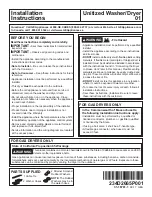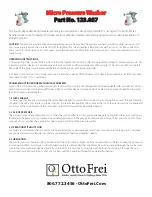
11
English
Symptom
Possible cause
Remedy
Even when the trigger is
released, the motor does
not stop, or it repeatedly
switches on and o
ff
.
There is water leaking from the high-
pressure hose.
○
Check and make sure that the connector
is securely connected.
○
If the high-pressure hose is damaged,
contact a HiKOKI Authorized Service
Center for repairs.
There is water leaking from the main unit or
the trigger gun.
Contact a HiKOKI Authorized Service
Center for repairs.
There is a problem with the main unit.
The high-pressure hose
won’t detach or is di
ffi
cult to
detach from the main unit
or the trigger gun.
Strong pressure is still being applied to the
high-pressure hose.
Switch o
ff
the power and squeeze the
trigger to release the pressure.
Water is leaking from the
washer.
The high-pressure hose or trigger gun is not
attached while the tank containing water is
attached.
This is not a malfunction.
○
Attach the high-pressure hose and
trigger gun.
○
When storing the washer, drain the water
from the tank and washer. See
Fig. 17
.
The charge indicator lamp
is rapidly blinking purple,
and battery charging
doesn’t begin.
The battery is not inserted all the way.
Insert the battery
fi
rmly.
There is foreign matter in the battery
terminal or where the battery is attached.
Remove the foreign matter.
The charge indicator lamp
blinks red, and battery
charging doesn’t begin.
The battery is not inserted all the way.
Insert the battery
fi
rmly.
The battery is overheated.
If left alone, the battery will automatically
begin charging if its temperature decreases,
but this may reduce battery life. It is
recommended that the battery be cooled in
a well-ventilated location away from direct
sunlight before charging it.
Battery usage time is short
even though the battery is
fully charged.
The battery’s life is depleted.
Replace the battery with a new one.
The battery takes a long
time to charge.
The temperature of the battery, the charger,
or the surrounding environment is extremely
low.
Charge the battery indoors or in another
warmer environment.
The charger’s vents are blocked, causing its
internal components to overheat.
Avoid blocking the vents.
The cooling fan is not running.
Contact a HiKOKI Authorized Service
Center for repairs.
The USB power lamp
has switched o
ff
and the
USB device has stopped
charging.
The battery’s capacity has become low.
Replace the battery with one that has
capacity remaining.
Plug the charger’s power plug into an
electric socket.
USB power lamp does not
switch o
ff
even though the
USB device has
fi
nished
charging.
The USB power lamp lights up green to
indicate that USB charging is possible.
This is not a malfunction.
It is unclear what the
charging status of a USB
device is, or whether its
charging is complete.
The USB power lamp does not switch o
ff
even when charging is complete.
Examine the USB device that is charging to
con
fi
rm its charging status.
Charging of a USB device
pauses midway.
The charger was plugged into an electrical
socket while the USB device was being
charged using the battery as the power
source.
This is not a malfunction.
The charger pauses USB charging for about
5 seconds when it is di
ff
erentiating between
power sources.
A battery was inserted into the charger while
the USB device was being charged using a
power socket as the power source.
Charging of the USB device
pauses midway when the
battery and the USB device
are being charged at the
same time.
The battery has become fully charged.
This is not a malfunction.
The charger pauses USB charging for
about 5 seconds while it checks whether
the battery has successfully completed
charging.
0000Book̲AW18DBL.indb 11
0000Book̲AW18DBL.indb 11
2017/12/01 13:47:06
2017/12/01 13:47:06












































